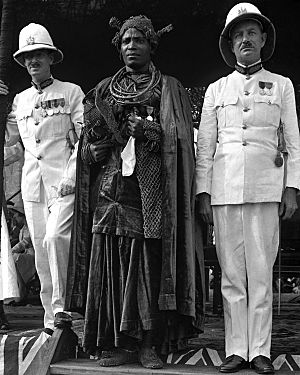John Stuart Macpherson facts for kids
Quick facts for kids
Sir John Stuart Macpherson
|
|
|---|---|

John Stuart Macpherson to the left, Akenzua II in the middle, Ivor Windsor-Clive, 2nd Earl of Plymouth to the right. Benin city, Nigeria, 1935
|
|
| 1st Governor-General of Nigeria | |
| In office 1 October 1954 – 15 June 1955 |
|
| Monarch | Elizabeth II |
| Preceded by | Himself (as Governor) |
| Succeeded by | James Wilson Robertson |
| Governor of Nigeria | |
| In office 5 February 1948 – 1 October 1954 |
|
| Monarch | George VI Elizabeth II |
| Preceded by | Arthur Richards |
| Succeeded by | Himself (as Governor-general) |
| Personal details | |
| Born | 25 August 1898 Edinburgh, Scotland |
| Died | 5 November 1971 (aged 73) United Kingdom |
| Education | George Watson's College University of Edinburgh. |
| Occupation | Civil servant |
| Military service | |
| Branch/service | |
| Unit | Argyll and Sutherland Highlanders |
Sir John Stuart Macpherson (born August 25, 1898 – died November 5, 1971) was an important British official. He worked in different parts of the British Empire. He is best known for being the Governor of Nigeria from 1948 to 1954. He then became Nigeria's first Governor-General from 1954 to 1955.
Contents
Early Life and Military Service
John Macpherson was born in Edinburgh, Scotland. His father was a hotel manager. John went to George Watson's College and then studied at the University of Edinburgh.
In 1917, during World War I, he joined the army. He became an officer in the Argyll and Sutherland Highlanders. He was hurt while fighting on the Western Front. Because of his injury, he had to wear a special steel support for his back for the rest of his life.
Career in Public Service
After World War I ended, Macpherson began a career in public service. He worked for the British government in different parts of the world.
Early Colonial Roles
- He started in the Malayan Civil Service. This was a group of officials who helped run the British colony of Malaya.
- From 1933 to 1935, he worked for the Colonial Office. This was the main government department in London that managed British colonies.
- In 1937, he moved to Nigeria as a senior assistant.
- From 1939 to 1943, he was the Chief Secretary of Palestine. This was another important role in a British-controlled territory.
International and Caribbean Work
- In 1943, he went to Washington, D.C., in the United States. He led the British Colonies Supply Mission. He also co-chaired the Anglo-American Caribbean Commission. This group worked on improving life in the Caribbean islands.
- From 1945 to 1948, he was in charge of development and welfare in the West Indies. He also co-chaired the Caribbean Commission.
Governor of Nigeria
In 1948, John Macpherson was appointed Governor of Nigeria. This was a very important job. He was in charge of the British colony of Nigeria. In 1954, Nigeria changed its status slightly, and he became the first Governor-General. He stayed in this role until he retired in 1955. James Wilson Robertson took over from him.
During his time as Governor, Macpherson introduced a new set of rules for how Nigeria was governed. This was called the 1951 Constitution. People sometimes called it the "Macpherson Constitution." It gave Nigerians more say in their own government. He also worked to help more Nigerians get important jobs in the public service. This process was called "Africanization."
Post-Governorship
After leaving Nigeria, Macpherson continued his public service.
- In 1956, he led a United Nations team that visited Trust Territories of the Pacific. These were areas managed by other countries after World War II.
- Later in 1956, he became the Permanent Under-Secretary of State for the Colonies. This was a very high-ranking job in the Colonial Office in London. He held this position until 1959.
Honours and Awards
Sir John Macpherson received several important awards for his service:
- He was made a Commander of the Order of St Michael and St George (CMG) in 1941.
- He was promoted to Knight Commander (KCMG) in 1945. This meant he could use the title "Sir."
- In 1951, he became a Knight Grand Cross (GCMG), which is the highest rank in that order.
- On July 2, 1947, he was also made an Officer of the Czechoslovak Order of the White Lion.

